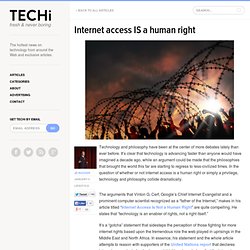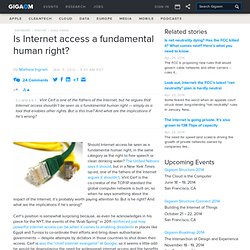

Internet Access Is a Human Right, Says United Nations. Is Internet access and online freedom of expression a basic human right?

The United Nations' Human Rights Council unanimously backed that notion in a resolution on Thursday. The resolution says that all people should be allowed to connect to and express themselves freely on the Internet. All 47 members of the Human Rights Council, including notoriously censorship-prone countries such as China and Cuba, signed the resolution. China's support for the resolution came with the stipulation that the "free flow of information on the Internet and the safe flow of information on the Internet are mutually dependent," as Chinese delegate Xia Jingge told the Council in a sign that the country isn't about to tear down the so-called "Great Firewall of China.
" The concept was first affirmed by a U.N. agency, the International Telecommunications Union (ITU), in 2003. Plenary panel. Déclaration des droits fondamentaux numériques. Le mardi 23 juin 2009, M.

Hervé Morin, président du Nouveau Centre, a présenté lors d’une conférence de presse à la Fondation pour l’innovation politique la Déclaration des droits fondamentaux numériques.Cette déclaration, reproduite ci-dessous, est accompagnée d’un commentaire explicatif : document complet à télécharger librement. Participez au débat sur www.droits-numeriques.org Le lundi 29 juin, de 17h30 à 19h30, la Fondation pour l’innovation politique organise une table ronde intitulée « Vers une déclaration des droits fondamentaux numériques » pour alimenter ce débat.Cliquez ici pour accéder à l’invitation. Préambule La révolution numérique ouvre des opportunités sans précédent au service de la libre communication des pensées et des opinions, du progrès, de la connaissance, de la diversité culturelle et linguistique, du développement économique et social, de la réduction des inégalités et de l’épanouissement personnel et professionnel. Access to the Internet and Human Rights - thanks Vint!
By Joy Liddicoat for APC WELLINGTON, New Zealand, 16 January 2012 13 January 2012 Dear Vint, Thanks for the best possible start to 2012 for internet rights advocates.

Is Internet Access A Human Right? An internet cafe in Istanbul.

(UGUR CAN/AFP/Getty Images) Smith & Ors, R. v (Rev 1) [2011] EWCA Crim 1772 (19 July 2011) Internet access IS a human right. Technology and philosophy have been at the center of more debates lately than ever before.

It’s clear that technology is advancing faster than anyone would have imagined a decade ago, while an argument could be made that the philosophies that brought the world this far are starting to regress to less-civilized times. Inforrm's Blog. In this feature we revisit older posts which remain of current interest.

In this updated post from May 2010 we consider the “human right to internet access”. At an early stage of the street protests the Egyptian government cut off almost all Internet and cell service. It has been suggested that young activists in in Egypt, in Tunisia and elsewhere in the Middle East, have used these electronic tools to organize protests. UK Human Rights Blog. A recent United Nations Human Rights Council report examined the important question of whether internet access is a human right.

Whilst the Special Rapporteur’s conclusions are nuanced in respect of blocking sites or providing limited access, he is clear that restricting access completely will always be a breach of article 19 of the International Covenant on Civil and Political Rights, the right to freedom of expression. But not everyone agrees with the United Nations’ conclusion. The Internet IS a (Human) RIght... It isn’t often that I find myself disagreeing with something that Vint Cerf, one of the ‘fathers of the internet’ has said, but when I read his much publicised Op Ed piece in the New York Times, I did.

First of all, and perhaps most importantly, I didn’t like the headline, which stated baldly and boldly that ‘Internet Access is not a Human Right’. Regardless of whether you agree or disagree with that statement, the piece said a great deal more than that – indeed, the main thrust of the argument was about the importance of the internet, and of internet access, to human rights. Many people will have just read the headline – or even read the many tweets which stated just that headline and a link – and drawn conclusions very different to those which Cerf might like. Pour Vinton Cerf, père d'Internet, sa création n'est pas un droit.
Is Internet access a fundamental human right? Should Internet access be seen as a fundamental human right, in the same category as the right to free speech or clean drinking water?

The United Nations says it should, but in a New York Times op-ed, one of the fathers of the Internet argues it shouldn’t. Vint Cerf is the co-creator of the TCP/IP standard the global computer network is built on, so when he says something about the impact of the Internet, it’s probably worth paying attention to. But is he right? And what are the implications if he’s wrong? Cerf’s position is somewhat surprising because, as even he acknowledges in his piece for the NYT, the events of the “Arab Spring” in 2011 reinforced just how powerful internet access can be when it comes to enabling dissidents in places like Egypt and Tunisia to co-ordinate their efforts and bring down authoritarian governments — despite attempts by dictators in those countries to shut down their access.
Internet Access Is Not a Human Right. UN report declares internet access a human right. A United Nations report said on Friday that disconnecting people from the internet is a human rights violation and against international law.

The report railed against France and the United Kingdom, which have passed laws to remove accused copyright scofflaws from the internet. It also protested blocking internet access to quell political unrest. While blocking and filtering measures deny users access to specific content on the internet, states have also taken measures to cut off access to the internet entirely. Vint Cerf: 'The internet is not a human right' 10 Ways to Build a Better Big Data Security Strategy. Internet Access Is Not a Human Right. Vint Cerf: Internet access is not a human right. One of the fathers of the internet, Vinton Cerf, widely known for creating the TCP/IP protocol took the opportunity in a recent NYT article to dismiss the idea that the internet is a civil or human right, saying that some people are missing the point entirely. He argues that use of the internet is not a human right, but is merely a method of communication, and entities such as the United Nations should be concentrating on more fundamental worldwide problems and not on making broadband communications a human right.
"Technology is an enabler of rights, not a right itself," he writes. "There is a high bar for something to be considered a human right. Loosely put, it must be among the things we as humans need in order to lead healthy, meaningful lives, like freedom from torture or freedom of conscience. It is a mistake to place any particular technology in this exalted category, since over time we will end up valuing the wrong things. " Vint Cerf: Internet access isn't a human right. Although some countries around the world argue that Internet access is a fundamental right , one of the "fathers of the Internet," Vint Cerf, doesn't see it that way. "Technology is an enabler of rights, not a right itself," Cerf, who is also a Google's chief Internet evangelist, wrote yesterday in an editorial in The New York Times. "There is a high bar for something to be considered a human right. Loosely put, it must be among the things we as humans need in order to lead healthy, meaningful lives, like freedom from torture or freedom of conscience.
It is a mistake to place any particular technology in this exalted category, since over time we will end up valuing the wrong things. " But not everyone is so quick to agree. The same year, the European Union's European Commission Vice President Viviane Reding wrote to the European Parliament, saying that Internet access is no different than other basic freedoms we value. But perhaps Reding and those who agree with her are missing the point. United Nations report: Internet access is a human right. Internet access is a human right, according to a United Nations report released on Friday. "Given that the Internet has become an indispensable tool for realizing a range of human rights, combating inequality, and accelerating development and human progress, ensuring universal access to the Internet should be a priority for all states," said the report from Frank La Rue, a special rapporteur to the United Nations, who wrote the document "on the promotion and protection of the right to freedom of opinion and expression.
" La Rue said in his report that access to the Internet is particularly important during times of political unrest, as demonstrated by the recent "Arab Spring" uprisings in Tunisia and Egypt, among other countries. From the report: DOCUMENT: Read the United Nations report La Rue also urges governments to eschew laws that allow for people's access to the Internet to be blocked. Israeli newborn named 'Like' in tribute to Facebook -- Nathan Olivarez-Giles.